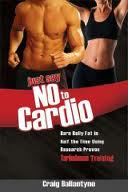Scary Reasons to Cut Cardio
 A tsunami of scientific studies have recently been published that give us 5 more scary reasons to ditch traditional cardio.
A tsunami of scientific studies have recently been published that give us 5 more scary reasons to ditch traditional cardio.
This breaking research just goes to show you that unless you are training for endurance sports, there’s practically no good reason to engage in long, slow cardio (especially really long sessions as you’ll discover in a moment).
First up, let’s take a look at why cardio fails as much as Jeff Spicoli from Fast Times at Ridgemont High.
(I’m saving the scariest study for last.)
In a study titled, “Why do individuals not lose more weight from an exercise intervention at a defined dose? An energy balance analysis“, researchers found that weight loss from cardio was always lower than predicted (using a standard calories in vs. calories out approach).
The article, published in Obesity Reviews (Vol. 13 Issue 6), explained that cardio doesn’t work for FOUR reasons:
a) Some people eat more when they start a cardio program
b) Calorie burning at rest often decreases with cardio
c) Calorie-burning lean tissue is often lost
d) Cardio programs cause you to do less activity over the day
So if you’re still trying to lose fat with cardio, those are the reasons why it’s not working (or why it didn’t work for you before you switched to Turbulence Training).
Second, speaking of TT style training, we now have another research study showing the fat burning power of interval training. This time, it’s from China…
In the study published in the Journal of Sports Medicine and Physical Fitness (2012 Jun;52(3):255-62), 60 overweight young women were separated into three groups.
Group 1 did a high intensity interval training (HIIT) program
Group 2 did moderate intensity continuous training (MICT)
Group 3 was a non-training control group.
Groups 1 & 2 trained five days per week for 12 weeks.
The researchers concluded that the HIIT group achieved better results than those in the MICT group.
But it’s not “new” to hear about intervals being better than slow cardio for fat loss, so finally, here’s the FIFTH scary reason you need to avoid cardio.
And believe me, it’s frightening, particularly to those who love their long-distance events like marathons.
 In a study published in the Mayo Clinic Proceedings (2012 Jun;87(6):587-95), researchers concluded that there are potential adverse cardiovascular effects from excessive endurance exercise.
In a study published in the Mayo Clinic Proceedings (2012 Jun;87(6):587-95), researchers concluded that there are potential adverse cardiovascular effects from excessive endurance exercise.
Frankly, this shouldn’t come as a surprise to anyone. After all, what happens when you do a high-volume workout?
Well, your muscles get really sore, right? And that’s called muscle damage.
Now think for a second…what is your heart?
It’s a muscle.
Therefore, when you do high-volume cardiovascular training, your heart experiences a LOT of muscle damage, and over the long-term this can damage your heart.
The researchers from the Mid America Heart Institute of Saint Luke’s Hospital in Kansas City, MO, said that while regular, short workouts are good for your heart, that long-term excessive endurance exercise may cause “pathologic” structural remodeling of the heart and large arteries”.
Pathological is bad, very bad.
You’ve heard the phrase “pathological liar”, right? Well, just imagine someone with a pathological heart. Notta too good.
The scientists found that training for and competing in extreme endurance events such as marathons, ultramarathons, ironman distance triathlons, and very long distance bicycle races, damage the heart.
Worse, they found that if done for years, it creates “patchy myocardial fibrosis” and could lead to arrhythmias.
Something to keep in mind if you’re a hardcore marathoner.
Get your heart checked.
It always disheartens me to read stories of men who pass away while running (the Toronto marathon had another death during the race last year). So make sure your ticker is up to par if you’re a cardio fanatic.
Be careful with your cardio, if you must do it at all.
For fat loss, it’s certainly not mandatory.
Diet is much more important than exercise (for both fat loss and heart-health), so take some of that excessive endurance training time and put it towards preparing a healthier diet.
No matter what, I want you to be active, but safe and smart.
As the lead researcher in that last study wisely said:
“When people come to me as a cardiologist and say they want to run a marathon I say, ‘OK, do one and cross it off your bucket list and then let’s focus on an exercise pattern that’s more ideal to producing long-term health benefits and improving your longevity.”
Words to live by.
Pardon me, words to live a LONG-TIME by.
TOMORROW: No-equipment fat-burning alternatives to cardio
Train hard but safe,
Craig Ballantyne, CTT
Certified Turbulence Trainer